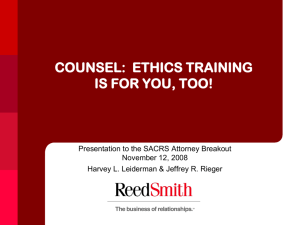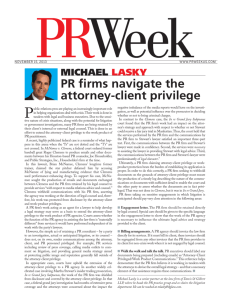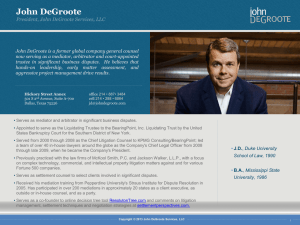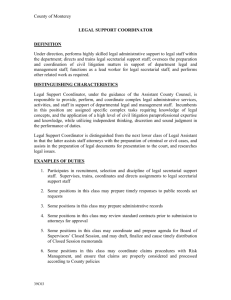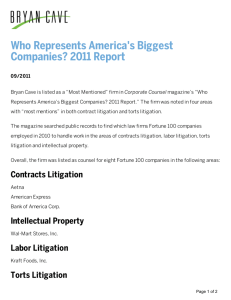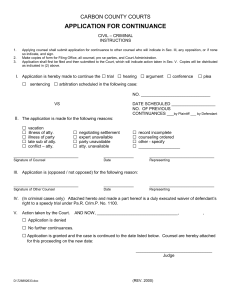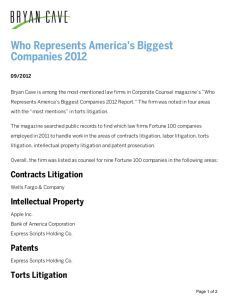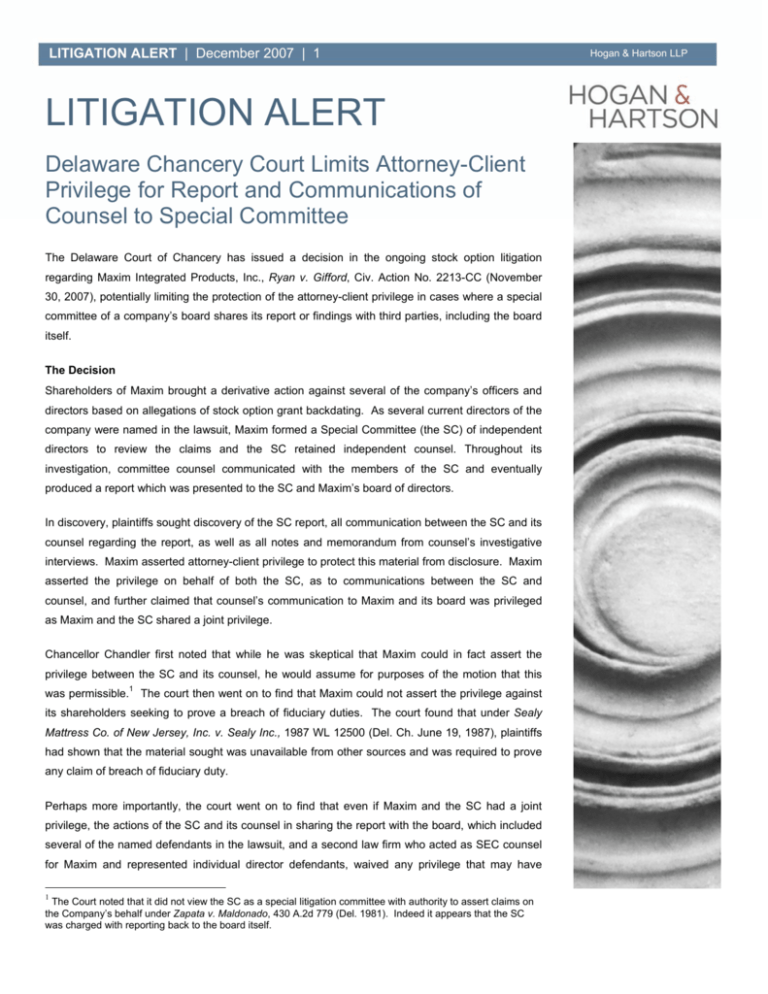
LITIGATION ALERT | December 2007 | 1
LITIGATION ALERT
Delaware Chancery Court Limits Attorney-Client
Privilege for Report and Communications of
Counsel to Special Committee
The Delaware Court of Chancery has issued a decision in the ongoing stock option litigation
regarding Maxim Integrated Products, Inc., Ryan v. Gifford, Civ. Action No. 2213-CC (November
30, 2007), potentially limiting the protection of the attorney-client privilege in cases where a special
committee of a company’s board shares its report or findings with third parties, including the board
itself.
The Decision
Shareholders of Maxim brought a derivative action against several of the company’s officers and
directors based on allegations of stock option grant backdating. As several current directors of the
company were named in the lawsuit, Maxim formed a Special Committee (the SC) of independent
directors to review the claims and the SC retained independent counsel. Throughout its
investigation, committee counsel communicated with the members of the SC and eventually
produced a report which was presented to the SC and Maxim’s board of directors.
In discovery, plaintiffs sought discovery of the SC report, all communication between the SC and its
counsel regarding the report, as well as all notes and memorandum from counsel’s investigative
interviews. Maxim asserted attorney-client privilege to protect this material from disclosure. Maxim
asserted the privilege on behalf of both the SC, as to communications between the SC and
counsel, and further claimed that counsel’s communication to Maxim and its board was privileged
as Maxim and the SC shared a joint privilege.
Chancellor Chandler first noted that while he was skeptical that Maxim could in fact assert the
privilege between the SC and its counsel, he would assume for purposes of the motion that this
was permissible.
1
The court then went on to find that Maxim could not assert the privilege against
its shareholders seeking to prove a breach of fiduciary duties. The court found that under Sealy
Mattress Co. of New Jersey, Inc. v. Sealy Inc., 1987 WL 12500 (Del. Ch. June 19, 1987), plaintiffs
had shown that the material sought was unavailable from other sources and was required to prove
any claim of breach of fiduciary duty.
Perhaps more importantly, the court went on to find that even if Maxim and the SC had a joint
privilege, the actions of the SC and its counsel in sharing the report with the board, which included
several of the named defendants in the lawsuit, and a second law firm who acted as SEC counsel
for Maxim and represented individual director defendants, waived any privilege that may have
1
The Court noted that it did not view the SC as a special litigation committee with authority to assert claims on
the Company’s behalf under Zapata v. Maldonado, 430 A.2d 779 (Del. 1981). Indeed it appears that the SC
was charged with reporting back to the board itself.
Hogan & Hartson LLP
LITIGATION ALERT | December 2007 | 2
existed. The court reinforced that “communications made in the presence of third persons not for
the purpose of seeking legal advice act as a waiver of the attorney-client privilege.” Ryan at 7.
While there does exist an exception for disclosure among parties with a common interest,
according to the court, in order for the exception to apply the third party must have interests that
are “so parallel and non-adverse that, at least with respect to he transaction involved, they may be
regarded as joint venturers.” Ryan at 7 (quoting Saito v. McKesson HBOC, Inc., No. 18553, 2002
WL 31657662, at *4 (Del. Ch. Nov. 13, 2002).
In this case, the Court found that the director-defendants and their counsel did not share a common
interest with the SC.
As the SC was formed to investigate the potential wrongdoings of the
directors named in the lawsuit, the relationship was more adversarial than cooperative. Moreover,
even though there was a potential argument that the named directors were present at the meeting
fulfilling their fiduciary duties as board members, this was overcome by the fact that they were now
seeking to rely on the report to exculpate themselves in litigation. Thus, any privilege was waived
as to the report, and as such waiver acted as a subject matter waiver, privilege was waived as to all
prior communications between counsel and the SC.
In contrast, in reviewing the claim of work product with respect to counsel’s interview memos and
notes, the court indicated that it was inclined to protect any opinion work product and ordered the
materials produced for in camera inspection to confirm that the material sought did in fact meet the
definition of opinion work product.
Analysis and Impact
Although almost all lawyers representing either a special committee or the company itself recognize
the distinction between the two, sharing of information between committee counsel and the
company is common, and indeed where the SEC or DOJ is involved often necessary. Likewise, in
today’s environment it is near certain that where any allegation of wrongdoing is unearthed,
plaintiff’s counsel will bring a derivative suit seeking to name as many of the company’s current
officers and directors as possible. The opinion in Ryan highlights the dangerous conflict between
these two facts.
In evaluating whether to share information between a special committee and the company board of
directors, counsel for both entities need to evaluate the likelihood that the non-committee members
of the board are or will be named in litigation and be placed in an adverse position to the
committee, resulting in possible waiver. Also, counsel need to be aware of the problem of subject
matter waiver and recognize that sharing just the report may not necessarily compartmentalize the
risk.
Counsel should also be cognizant of the difference between attorney-client privileged material, fact
work product and opinion work product and how a reviewing court is likely to analyze these
different categories of material.
One additional observation arises out of the court’s Zapata footnote. Ryan at 5, n.2. Where a
special committee is given formal authority to assert claims on behalf of the company, such as a
LITIGATION ALERT | December 2007 | 3
special litigation committee, there appears to be a suggestion in the court’s opinion that it will be
much harder to find a joint privilege even if the non-committee directors are not defendants.
Committees with explicit reporting responsibilities to the board will likely be in a better position to
assert a joint privilege.
For more information about the matters discussed in this Litigation Alert, please contact the Hogan
& Hartson LLP attorney with whom you work, or any of the attorneys below who contributed to this
update.
STUART ALTMAN
smaltman@hhlaw.com
202.637.3617
Washington, D.C
This Update is for informational purposes only and is not intended as basis for decisions in specific situations. This information
is not intended to create, and receipt of it does not constitute, a lawyer-client relationship.
Copyright © 2007 Hogan & Hartson LLP. All rights reserved. Hogan & Hartson LLP is a District of Columbia limited liability
partnership with offices across the United States and around the world. Some of the offices outside of the United States are
operated through affiliated partnerships, all of which are referred to herein collectively as Hogan & Hartson or the firm.
www.hhlaw.com

